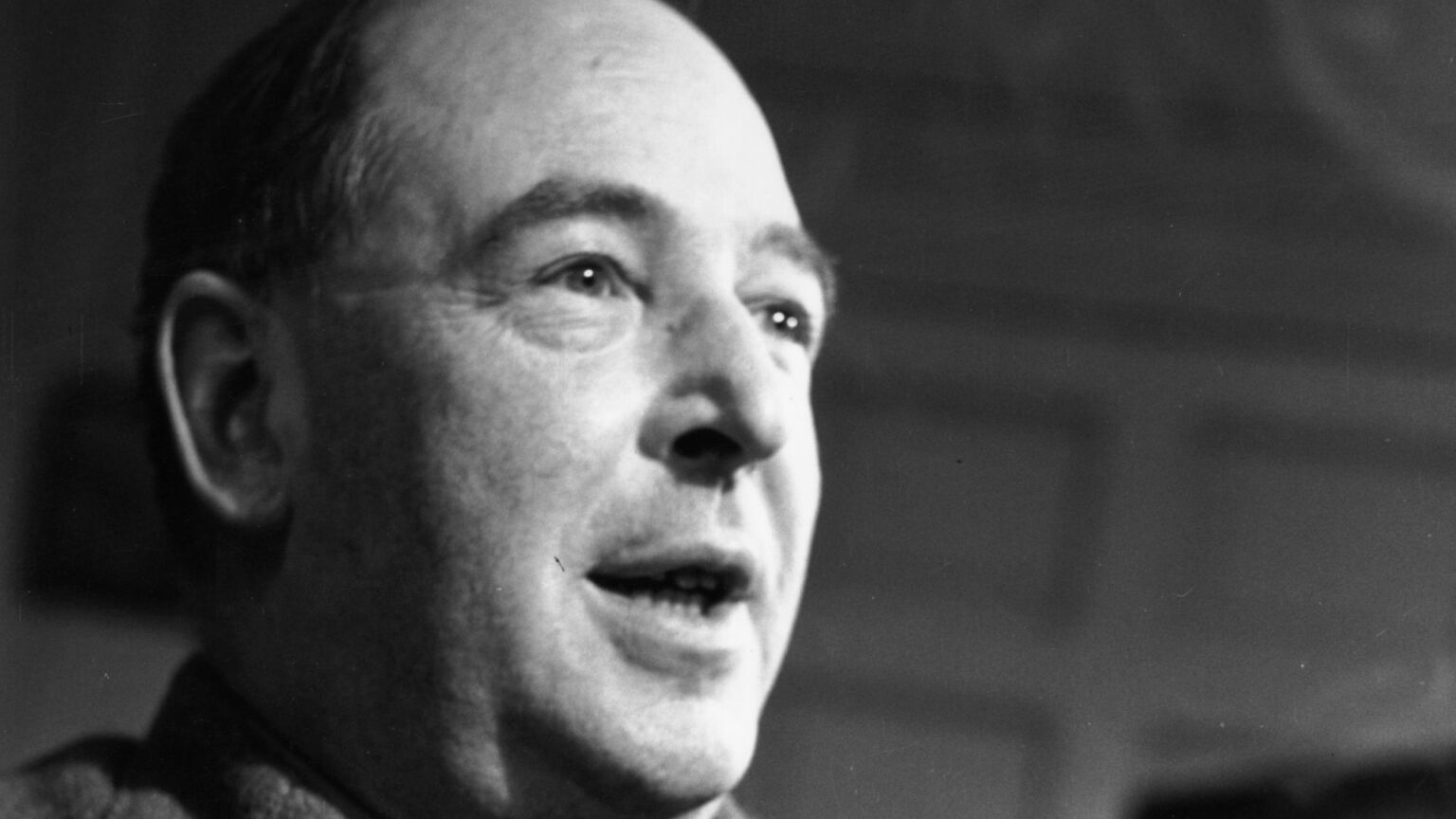CS Lewis: a hard-right icon?
On the 75th anniversary of The Lion, the Witch and the Wardrobe, Lewis has never been so misunderstood.

Want unlimited, ad-free access? Become a spiked supporter.
In February 2023, the Spectator reported that a unit within Prevent, the UK Home Office’s counter-extremism programme, had drawn up several lists of dangerous books. It claimed that these works could prompt or indicate support for the ‘far right’ or, horror of centrist horrors, ‘Brexit’. Among the specific works mentioned were novels by titans of English literature, including George Orwell, Joseph Conrad, JRR Tolkien and, arguably the most influential Christian thinker of the 20th century, CS Lewis.
That Britain’s security establishment could consider Lewis a ‘radicalising influence’ may seem absurd to those who’ve actually read his work. But it is a view that is shared by our leftish, ‘progressive’ cultural elites who, over recent decades, have shunned and disdained Lewis. They view his professed love of England, and his reverence for the Judeo-Christian tradition of the West, with deep suspicion. If that makes him a neo-fascist terror threat, then God help the rest of us.
Lewis is probably best known for authoring the beloved children’s series, the Chronicles of Narnia, the first novel of which was published 75 years ago today, on 16 October 1950. Those who read the The Lion, the Witch and the Wardrobe as children will likely remember it as a tale of redemption, self-sacrifice and friendship.
It is also unapologetically theological. The central figure, a benevolent lion slain by an evil regime and subsequently resurrected, is undoubtedly the Narnian equivalent to Christ. This element of the story has been a stumbling block for many since its publication, and is even more so now.
Author Philip Pullman’s ‘critique’ of the Chronicles of Narnia captures well the cultural-elite aversion to all things Lewis. Pullman called the series ‘one of the most ugly and poisonous things I’ve ever read’, ‘religious propaganda’, ‘racist’, ‘misogynistic’, ‘vile’, ‘life-hating’, ‘nauseating drivel’, ‘loathsome’, ‘disgusting’, and ‘so hideous and cruel I can scarcely contain myself when I think of it’. Tell us what you really think, Phil.
One can only imagine what Pullman made of Lewis’s other works. Indeed, much of Lewis’s early acclaim resulted from a series of wartime radio broadcasts he made on the subject of Christianity.
Quite why Prevent, in particular, has been so suspicious of Lewis is especially puzzling. ‘Non-violent extremism’ of the type Prevent claims to specialise in is defined as ‘vocal or active opposition to fundamental British values, including democracy, the rule of law, individual liberty and mutual respect and tolerance of different faiths and beliefs’. Even granting these nebulous classifications, it is difficult to square any of them with the works of Lewis.
Indeed, far from being in opposition to individual liberty, Lewis was a strong proponent of it. Building on his belief in the Fall of Man, he was convinced that ‘no man can be trusted with unchecked power over his fellows’. For this same reason, he wrote in Present Concerns, ‘I reject slavery because I see no men fit to be masters’. Even in the fantastical world of Narnia, justice comes in the form of restoring its inhabitants’ individual liberties. ‘Creatures, I give you yourselves’, says a resurrected Aslan following the White Witch’s defeat. In Lewis’s vision, individual liberty was an indispensable part of being human.
And what of the other accusations levelled at Lewis today, such as racism and Islamophobia? There have long been grumblings about his portrayals of the ‘exotic other’ in the Chronicles of Narnia, particularly in reference to the Arab-like ‘Calormen’ – a race of dark-skinned people who live in a desert region, wear ‘long-flowing robes and orange turbans’, and like to invade their neighbours. There is no doubt Lewis was a man of his time, and one who had never been to the Middle East, at that. But the cries of racism and Islamophobia from modern critics appear to lack both substance and context.
It is perfectly valid to argue that Lewis’s portrayal of the Calormen was ‘orientalist’. But the accusation of prejudice goes both ways. Lewis’s Middle Eastern contemporaries deployed equally negative, stereotyped depictions of the West. Much early 20th-century Ottoman literature portrayed Europeans, particularly the Franks, as materialistic, greedy and morally corrupt. If Lewis is to be condemned for clumsy stereotypes then so too should his countless other great contemporaries from all over the world.
What’s more, Lewis was invariably a voice of toleration. He frequently argued that people who believed and lived differently to himself should be treated charitably. ‘Be kind to those who have chosen different doors and to those who are still in the hall’, he wrote in his 1952 work, Mere Christianity. ‘If they are wrong they need your prayers all the more; and if they are your enemies, then you are under orders to pray for them.’
In this way, Lewis promulgated a form of liberalism. He wanted people to have the grace to be civil to those with whom they disagree. At the same time, he had no qualms about rejecting the kind of moral relativism which denies objective truth and refuses to exercise judgement – something the British establishment has greatly struggled with in recent years.
Then there’s Lewis’s alleged ‘cultural nationalism’, an ideology that Prevent lists alongside ‘white supremacy’ and ‘white / ethno-nationalism’ as cause for concern.
There’s no doubt that Lewis had a deep affection for Britain. Born in Northern Ireland, Lewis moved to England at just 13 years old, and struggled to adapt to the ‘flippancy’ and ‘smugness’ of his Anglo-Saxon peers. Regardless, he came to love his adoptive nation and fought for it during the First World War.
In The Four Loves, Lewis describes Britain fondly as a land of ‘beer and tea and open fires, trains with compartments in them and an unarmed police force and all the rest of it’. A place where the ‘family offers us the first step beyond self-love’, and the nation ‘offers us the first step beyond family selfishness’. His affection for his country is ‘not in the least aggressive’, Lewis adds. ‘It would be hard to find any legitimate point of view from which this feeling could be condemned… It asks only to be let alone.’
On the flipside, Lewis was no chauvinist. In The Problem of Pain, he highlights the danger of making one’s country an idol, or believing oneself to be a member of a ‘chosen’ people. In The Screwtape Letters, the undersecretary of the devil explains to a less experienced demon that making his assigned human virulently patriotic above all else is a fantastic way to lead him astray. These certainly don’t sound like the musings of a violent ethno-nationalist.
Lewis’s works of fiction were not perfect – his friend Tolkien had strong objections to the mythological inconsistency of Father Christmas’s appearance in Narnia. But they were filled with the type of wonder, imagination and playful metaphor that many contemporary writers, particularly children’s writers, seem to lack. This is presumably why millions of children, of all faiths and none, have gleefully walked through the wardrobe to Narnia over the past three-quarters of a century.
‘Of all tyrannies, a tyranny sincerely exercised for the good of its victims may be the most oppressive’, Lewis wrote in his essay collection, God in the Dock. It is an apt description of the modern British government’s attempt to clamp down on wrongthink. It is unclear how many convicted terrorists actually had CS Lewis on their (no doubt very Brexity) bookshelves, but I would wager the answer is none. Placing a black mark besides Lewis’s name only reveals the fear of the supposedly enlightened few that one day, we too may learn to hold up the mirror to them, just as he once did.
Georgina Mumford is a spiked intern.
You’ve hit your monthly free article limit.
Support spiked and get unlimited access.
Support spiked and get unlimited access
spiked is funded by readers like you. Only 0.1% of regular readers currently support us. If just 1% did, we could grow our team and step up the fight for free speech and democracy.
Become a spiked supporter and enjoy unlimited, ad-free access, bonus content and exclusive events – while helping to keep independent journalism alive.
Monthly support makes the biggest difference. Thank you.










Comments
Want to join the conversation?
Only spiked supporters and patrons, who donate regularly to us, can comment on our articles.